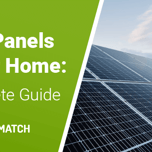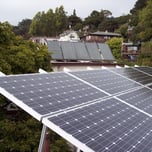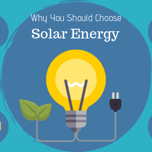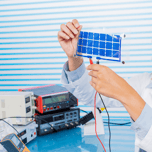
Get up to 4 quotes by filling in only 1 quick form

Slash your energy bills by installing solar panels

We’ve helped over 500,000 homeowners reduce their carbon footprint
- GreenMatch
- Solar Energy
- Solar Panels
- Solar Panels for Motorhomes
Solar Panels for Motorhomes
Why Are Solar Panels Beneficial for Motorhomes?
Solar energy is always praised for being an eco-friendly alternative to fossil fuel and it is increasingly being embraced by homeowners all over the world. Despite environmental-friendliness being their most famous benefit, solar panels also have another huge advantage: they increase your home’s independence from the grid. That becomes especially beneficial for two types of homes: those that are located in remote places with scarce access to electricity, and those that are constantly on the move. Owning a motorhome is often about being completely free – even from electric cables. Solar panels in the UK can give you the independence you need while reducing your carbon emissions. However, choosing the right system for you might be complicated. Below, you will find all the information you need about solar panels.
Choosing the Right Solar Panels
The first thing you need to know before investing in solar panels is the amount of electricity you need to power your motorhome. You can find out by going camping with a fully charged battery without connecting to electricity and calculating for how long the battery can power your appliances. When the battery goes out of power, you can calculate the average energy used per day and choose the solar panels that would provide the same amount of energy to the battery. If you cannot calculate your average power usage, you can check the power ratings of each type of home appliance to estimate the amount of electricity you would need, and add them all up.
Solar Systems
Solar panels come with different power ratings, ranging from 1 kWh and 12 kWh for domestic use. Most UK solar-powered homes use mid-range solar systems, such as 4 kWh and 5 kWh. Lower rated systems usually do not generate enough electricity to power home appliances, while those over 6 kWh are suitable for very large properties. Ratings show the amount of power that the panels produce under standard working conditions, but these numbers are mainly used to compare solar panels and do not indicate the exact power output of solar panels at all times. For instance, 4 kWh panels will not generate that amount of power at any hour of the day, but it does mean that they will generate less power than 6 kWh panels. In fact, power output varies depending on the hour of the day and the season. The peak season is naturally summer, which is when the solar panels are exposed to sunlight for longer and the skies are clearer from clouds.
Types of Solar Panels
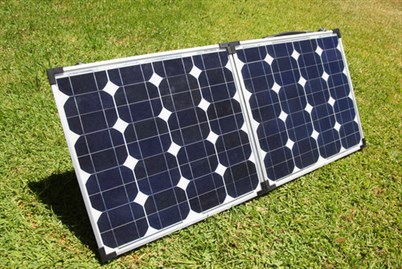
There are two main types of solar panels: thin film and crystalline. Crystalline solar panels can either be mono- or polycrystalline depending on the purity of the silicon they are made of. They also look different: monocrystalline cells are black with rounded angles, polycrystalline ones are blue and speckled, with sharp angles.
The other category is thin film or amorphous solar panels, which are made of a fine layer of silicon sprayed on another backing material. Because they utilise much less material than their crystalline counterparts, thin film panels, such as flexible solar panels, are cheaper, but they are also less durable and efficient, so they take up much more space.
Mono- and polycrystalline solar panels, on the other hand, are made in a similar way and the differences between them are less significant. Monocrystalline panels are slightly more efficient and expensive. It is mostly a matter of quality: very well made polycrystalline panels will likely perform better than low-quality monocrystalline ones. However, these differences matter even less in the case of motorhomes, since the panels are meant to power a leisure battery. If you are considering installing panels at home, you might want to take these differences into account. Lastly, don’t forget that crystalline solar panels are more susceptible to shade, so be careful even the smallest shadow can affect the solar panel’s efficiency.
Solar Panel Tips
If you’re considering investing in solar panels for your motorhome, there are some more practical facts you should be aware of:
- You will still need a leisure battery to power your appliances. The solar panels will feed energy to the battery just like an electric hook-up point would. The main difference is that you would be continuously producing energy without having to stop at a certain place to recharge the battery. Solar panels allow you to be more independent from the grid. Connecting them to the battery is usually as easy as attaching a few clip unless the motorhome manufacturer provides special adaptors.
- You should consider whether you want fixed or mobile solar panels. The choice should be made keeping in mind that the panels must have the best sun exposure possible. They should be positioned to take advantage of the strongest sunlight, which comes at midday. Thus the panels have to be positioned facing south since the light comes directly overhead only in the summer and from the south in the other seasons. Angling the panels southward will maximise the output during most seasons.
- You will need an inverter to turn the DC power generated by the panels into AC power, which is what your appliances use.
- You will need to make sure your battery is always in sound condition since you will be relying on it to use the electricity you produce. Solar panels have a quite long lifespan, but taking care of your battery is of primary importance in the case of motorhomes.
- Solar panels also work when the sky is not clear, and even behind glass. However, you should keep them outside to maximise their efficiency. If they are shielded by glass or plastic, it might take them up to three times longer to power up your battery even with a clear sky, because they are designed for direct exposure.
Would You Like to Invest in Solar Panels?
If you are interested in purchasing solar panels for your home, you can use Greenmatch to receive up to 4 free, non-binding quotes from our certified suppliers. Simply fill in the form on the top of the page and you will receive your personalised quotes without having to spend any more time on researching potential suppliers and brands.
Fill in the form in just 1 minute
 We strive to connect our customers with the right product and supplier. Would you like to be part of GreenMatch?
We strive to connect our customers with the right product and supplier. Would you like to be part of GreenMatch? 
